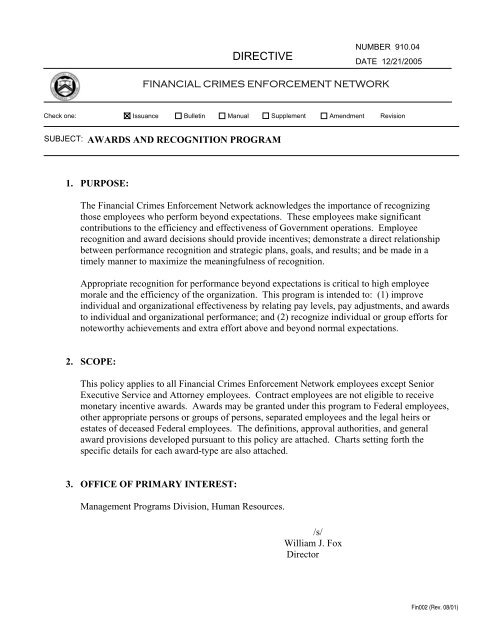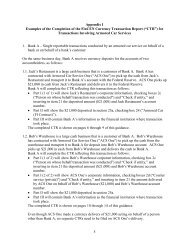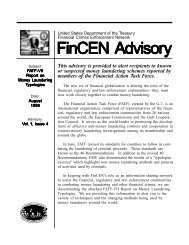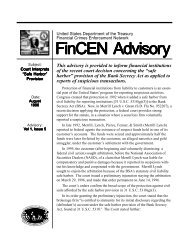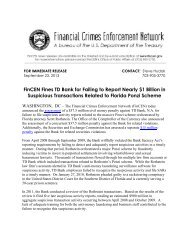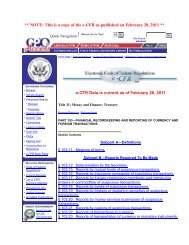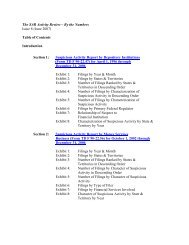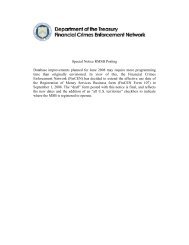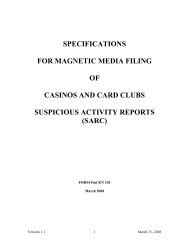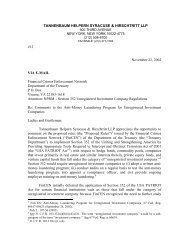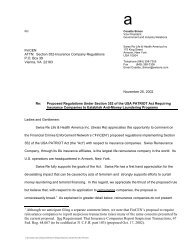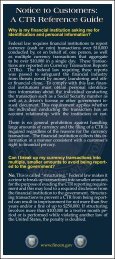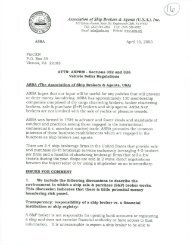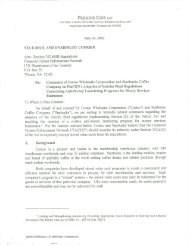Awards and Recognition - FinCEN
Awards and Recognition - FinCEN
Awards and Recognition - FinCEN
You also want an ePaper? Increase the reach of your titles
YUMPU automatically turns print PDFs into web optimized ePapers that Google loves.
NUMBER 910.04<br />
DIRECTIVE DATE 12/21/2005<br />
Check one: Issuance Bulletin Manual Supplement Amendment Revision<br />
SUBJECT:<br />
FINANCIAL CRIMES ENFORCEMENT NETWORK<br />
AWARDS AND RECOGNITION PROGRAM<br />
1. PURPOSE:<br />
The Financial Crimes Enforcement Network acknowledges the importance of recognizing<br />
those employees who perform beyond expectations. These employees make significant<br />
contributions to the efficiency <strong>and</strong> effectiveness of Government operations. Employee<br />
recognition <strong>and</strong> award decisions should provide incentives; demonstrate a direct relationship<br />
between performance recognition <strong>and</strong> strategic plans, goals, <strong>and</strong> results; <strong>and</strong> be made in a<br />
timely manner to maximize the meaningfulness of recognition.<br />
Appropriate recognition for performance beyond expectations is critical to high employee<br />
morale <strong>and</strong> the efficiency of the organization. This program is intended to: (1) improve<br />
individual <strong>and</strong> organizational effectiveness by relating pay levels, pay adjustments, <strong>and</strong> awards<br />
to individual <strong>and</strong> organizational performance; <strong>and</strong> (2) recognize individual or group efforts for<br />
noteworthy achievements <strong>and</strong> extra effort above <strong>and</strong> beyond normal expectations.<br />
2. SCOPE:<br />
This policy applies to all Financial Crimes Enforcement Network employees except Senior<br />
Executive Service <strong>and</strong> Attorney employees. Contract employees are not eligible to receive<br />
monetary incentive awards. <strong>Awards</strong> may be granted under this program to Federal employees,<br />
other appropriate persons or groups of persons, separated employees <strong>and</strong> the legal heirs or<br />
estates of deceased Federal employees. The definitions, approval authorities, <strong>and</strong> general<br />
award provisions developed pursuant to this policy are attached. Charts setting forth the<br />
specific details for each award-type are also attached.<br />
3. OFFICE OF PRIMARY INTEREST:<br />
Management Programs Division, Human Resources.<br />
/s/<br />
William J. Fox<br />
Director<br />
Fin002 (Rev. 08/01)
1. PROGRAM DEFINITIONS:<br />
AWARDS AND RECOGNITION PROGRAM<br />
Attachment 1<br />
a. Approving Official. Individual who has authority to approve the award <strong>and</strong> expend<br />
the funds to pay the award. The Approving Official cannot be the Recommending<br />
Official. See “Approval Authorities” for more information.<br />
b. Basic pay. If an award is calculated as a percentage of “basic pay,” basic pay is the<br />
annual salary not including locality pay or geographical adjustments.<br />
c. Honorary award. A Special Act Award in the form of a letter, certificate, plaque,<br />
citation, or similar non-monetary item. Also known as a non-monetary award.<br />
d. Monetary award. Any award paid in the form of cash or time off.<br />
e. Non-monetary award. See definition of “Honorary Award.”<br />
f. On-the-Spot Award. A smaller Special Act Award for which there is an expedited<br />
approval <strong>and</strong> payment process. Unlike other awards, the awardee receives the full<br />
amount of a Spot Award. (Spot <strong>Awards</strong> are “grossed-up” in the payroll system to<br />
cover taxes.)<br />
g. Performance Award. An award that is based on a rating of record. This includes cash<br />
awards <strong>and</strong> Quality Step Increases (QSIs).<br />
h. Quality Step Increase (QSI). An increase in basic pay from one step of the GS/GC<br />
pay scale to the next in recognition of sustained, excellent performance. This<br />
increase must be based on “Outst<strong>and</strong>ing” performance on a rating of record.<br />
i. Recommending Official. The supervisor or manager who initiates an award. The<br />
Recommending Official must be classified as a supervisor <strong>and</strong> cannot also be the<br />
Approving Official.<br />
j. Special Act Award. A monetary or non-monetary award based on documentation of<br />
an individual’s or group’s exceptional contributions to a project, program, or activity.<br />
Monetary Special Act <strong>Awards</strong> can be paid in cash or time off. Non-monetary Special<br />
Act <strong>Awards</strong> are known as “Honorary <strong>Awards</strong>.”<br />
k. Time Off Award. A Special Act (including Spot) or Suggestion Award paid in the<br />
form of time off from duty without loss of pay or charge to leave.<br />
Fin002 (Rev. 08/01)
2. APPROVAL AUTHORITIES:<br />
a. The Executive Board will meet every year <strong>and</strong> recommend to the Director for ratification<br />
budgets for Performance <strong>Awards</strong>, Special Act or Service awards <strong>and</strong> Directors Award<br />
programs. The Executive Board will determine Performance Award budgets for each<br />
Associate Director or equivalent Office head, <strong>and</strong> will also determine the Special Act <strong>and</strong><br />
Director’s Award budget for the Director. The Executive Board will also specify the award<br />
range that may be used for “Outst<strong>and</strong>ing” <strong>and</strong> “Exceeded” performance ratings.<br />
b. All awards must be approved at a management level higher than the supervisor or manager<br />
who recommended the award. Exceptions would include when the Director is the<br />
recommending official, or for some On-the-Spot <strong>and</strong> time-off awards. (See Attachment 2<br />
for summary chart of approving authorities.)<br />
c. Assistant Directors can approve for employees the Assistant Director supervises On-the-Spot<br />
awards in cash up to $500 per person or group <strong>and</strong> time-off awards up to 16 hours per person<br />
or group.<br />
d. Associate Directors or Chief of Staff can approve for employees the Associate Director or<br />
Chief of Staff supervises:<br />
(1) Performance <strong>Awards</strong> within the ranges set by the Executive Board.<br />
(2) On-the-Spot awards up to $500 per person or group.<br />
(3) Time-off awards up to 40 hours per person per award, not to exceed 80 hours per<br />
person per year.<br />
(4) Quality Step Increases (QSI's).<br />
e. The Deputy Director can approve for the employees the Deputy Director supervises <strong>and</strong> for<br />
employees recommended for awards by an Assistant Director or Associate Director who do<br />
not supervise that employee.<br />
f. The Director (or the Director’s written delegate) can approve:<br />
(1) Any individual or group cash award (Special Act or Performance), not to exceed<br />
$10,000 per individual or group.<br />
(2) Quality Step Increases (QSI's).<br />
(3) Honorary <strong>Awards</strong> up to $150.<br />
(4) Director’s <strong>Awards</strong>.<br />
g. Award Limitations:<br />
<strong>Awards</strong> over $10,000 per individual or group must be submitted to Treasury for review, then:<br />
(1) The Office of Personnel Management (OPM) can approve awards from $10,001 to<br />
$25,000.<br />
(2) The President can approve awards exceeding $25,000.<br />
Fin002 (Rev. 08/01)
3. GENERAL PROGRAM PROVISIONS:<br />
a. <strong>Awards</strong> must be recommended by employees who are classified as supervisors or managers.<br />
All employees are encouraged to make appropriate staff aware of exceptional performance or<br />
special acts, but they cannot initiate awards as Recommending Officials on award<br />
recommendations, except as provided by the Director’s Award Program.<br />
b. All award documentation is generated <strong>and</strong> maintained within the HRConnect system.<br />
c. A supervisor or manager who recommends an award for an employee not under his or her<br />
permanent supervisory control must contact the employee’s supervisor of record to obtain<br />
concurrence prior to approval <strong>and</strong> processing of the award.<br />
d. Employees should be recognized as closely as possible to the specific actions or events that<br />
warranted the award, but no later than one calendar year after. Prompt recognition <strong>and</strong><br />
reward is preferable.<br />
e. The effective date of special acts, on-the-spot, <strong>and</strong> time-off awards may not precede the<br />
date(s) the award recommendation was signed by recommending <strong>and</strong> approving officials.<br />
f. Cash awards are subject to budget limitations.<br />
g. Cash awards are in addition to regular pay. They are subject to taxes.<br />
h. An employee can receive any number of awards provided each award is for a special act or<br />
service except for specific award limits as specified in this policy.<br />
i. Performance awards are not payable in the form of time off.<br />
j. Recommending officials may discuss with the employee the desirability of an On-the-Spot<br />
versus a time-off award.<br />
4. PROGRAM RESPONSIBILITIES:<br />
a. The Director <strong>and</strong> Deputy Director provide the overall direction for the <strong>Awards</strong> <strong>and</strong><br />
<strong>Recognition</strong> Program. The Management Programs Division <strong>and</strong> the Office of Outreach <strong>and</strong><br />
Workplace Solutions operationally manage the <strong>Awards</strong> <strong>and</strong> <strong>Recognition</strong> Program. The<br />
Director will make the final decision on any Director’s Award. Further, the Director, or the<br />
Director’s written delegate, will review <strong>and</strong> approve Special Act <strong>and</strong> group award<br />
recommendations quarterly.<br />
b. The Chief, Office of Outreach <strong>and</strong> Workplace Solutions works with Director on the<br />
Director’s Award program, including the development of the categories of the awards <strong>and</strong><br />
recognition that may be made that year. The Chief solicits nominations for each category;<br />
receives nominations for each category <strong>and</strong> prepares memor<strong>and</strong>um for Executive Board<br />
recommendations; <strong>and</strong> the Chief organizes an award ceremony. In addition, the Office of<br />
Outreach <strong>and</strong> Workplace Solutions prepares an Analysis of Award data in conjunction the<br />
Federal Agency Annual EEO Program Status Report.<br />
Fin002 (Rev. 08/01)
c. The Chief of Staff, Associate Directors, <strong>and</strong> Assistant Directors, are responsible for<br />
managing the awards programs consistently across their organization. Associate <strong>and</strong><br />
Assistant Directors are responsible for promoting a proactive employee awards <strong>and</strong><br />
recognition program. They:<br />
(1) Ensure that all managers <strong>and</strong> supervisors, within their area of responsibility, comply<br />
with the guidelines <strong>and</strong> procedures described in this directive,<br />
(2) Assure equal opportunity for all employees to earn awards,<br />
(3) Ensure prompt action on all employee performance award recommendations, <strong>and</strong><br />
(4) Manage award funding within annual targets approved by the Executive Board.<br />
d. The Assistant Director, Financial Management is responsible for:<br />
(1) Requesting adequate funds for the program through the Federal Budget Process,<br />
(2) Developing an annual funding proposal to include targets for Executive Board<br />
approval, <strong>and</strong><br />
(3) Monitoring award expenditures.<br />
e. The Assistant Director, Human Resources, is responsible for:<br />
(1) Administering the <strong>Awards</strong> <strong>and</strong> <strong>Recognition</strong> Program in accordance with established<br />
policies <strong>and</strong> procedures,<br />
(2) Reviewing awards for technical accuracy <strong>and</strong> consistency, <strong>and</strong><br />
(3) Processing awards, including ensuring that time-off awards are credited to the<br />
employee.<br />
f. Supervisors <strong>and</strong> Managers are responsible for:<br />
(1) Recognizing employee contributions in a fair <strong>and</strong> equitable manner,<br />
(2) Encouraging employee excellence,<br />
(3) Recommending <strong>and</strong> approving awards in accordance with the delegations of authority<br />
for incentive awards,<br />
(4) Notifying employee of award in a timely manner, <strong>and</strong><br />
(5) Obtaining concurrence from the supervisor of record when nominating an employee<br />
for an award for which he or she does not permanently supervise.<br />
g. Employees are responsible for:<br />
(1) Underst<strong>and</strong>ing Financial Crimes Enforcement Network’s <strong>Awards</strong> <strong>and</strong> <strong>Recognition</strong><br />
Program, <strong>and</strong><br />
(2) Bringing noteworthy accomplishments of fellow employees to his or her supervisor’s<br />
attention.<br />
5. CONFIDENTIALITY:<br />
Performance award nominations contain privileged information that should be made available<br />
only to those involved in the decision process <strong>and</strong> certain other officials on a need-to-know<br />
basis. Recommending officials should not discuss award recommendations with nominees until<br />
Fin002 (Rev. 08/01)
the award has been approved or, in the case of external award nominations (i.e., awards<br />
sponsored by private organizations), until the nominee has been selected by the Director as the<br />
c<strong>and</strong>idate for that award. However, when nominations for external awards require personal<br />
information (e.g., date of birth, home address, professional affiliations, employment history, etc.)<br />
be furnished, permission must be obtained from the nominee before such information is<br />
furnished to the private sector.<br />
6. PROGRAM EVALUATION:<br />
Periodic evaluations of the <strong>Awards</strong> <strong>and</strong> <strong>Recognition</strong> Program will be made through a regularly<br />
scheduled Human Resources (HR) evaluation process or as deemed appropriate by HR to assure<br />
requirements of law are effectively implemented <strong>and</strong> to identify areas in need of improvement.<br />
Fin002 (Rev. 08/01)
An X indicates approval authority.<br />
Type of Award<br />
Performance awards<br />
for: “O” <strong>and</strong> “E”<br />
(range to be<br />
approved yearly)<br />
Special Act <strong>and</strong><br />
Group awards<br />
On-the-Spot up to<br />
$500 per person or<br />
group<br />
Time-Off Award<br />
Up to 16/18 hours per<br />
person or group<br />
Time-Off Award<br />
over 16/18 hours <strong>and</strong><br />
up to 40 hours per<br />
person per award<br />
Quality Step Increase<br />
(QSI)<br />
Directors <strong>Awards</strong><br />
Honorary <strong>Awards</strong><br />
Letter of<br />
Commendation<br />
Assistant<br />
Director<br />
X<br />
APPROVAL AUTHORITIES<br />
Chief of<br />
Staff/Assoc.<br />
Director<br />
Deputy<br />
Director<br />
X X<br />
X X<br />
X X X<br />
X X<br />
X X<br />
Director<br />
X<br />
X<br />
X<br />
X<br />
X<br />
X<br />
X<br />
Attachment 2<br />
Comments<br />
Provided total awards in a<br />
given year are within the<br />
approving official’s budget.<br />
Requests to exceed budget<br />
require approval at the next<br />
higher level as depicted on this<br />
table.<br />
May be approved up to a<br />
maximum of $10,000.<br />
<strong>Awards</strong> that would grant<br />
$10,001-$25,000 to an<br />
individual employee<br />
require OPM approval.<br />
<strong>Awards</strong> that would grant more<br />
than $25,000 to an individual<br />
require OPM review <strong>and</strong><br />
approval <strong>and</strong> final approval by<br />
the President.<br />
Provided total awards in a<br />
given year are within the<br />
approving official’s budget.<br />
Requests to exceed budget<br />
require approval at the next<br />
higher level as depicted on this<br />
table.<br />
May not exceed 80 hours per<br />
person per year<br />
May not exceed 80 hours per<br />
person per year<br />
May not exceed one in a 52week<br />
period<br />
Process highlighted in<br />
Attachment 6<br />
Fin002 (Rev. 08/01)
PERFORMANCE AWARDS<br />
General Information 1.<br />
Performance <strong>Awards</strong> are granted in cash.<br />
Attachment 3<br />
2. To qualify for a Performance Award, the summary rating on the<br />
current rating of record must be at least “Exceeded.”<br />
3. The award is based on a current rating of record.<br />
4. The performance must have occurred during the 12-month period<br />
prior to the date of the recommendation.<br />
5 <strong>Awards</strong> are considered approved when the Recommending <strong>and</strong><br />
Approving Official have forwarded the award action in HRConnect<br />
to HR. (See Attachment 2 for summary chart of approving<br />
authorities.)<br />
6. The employee must not have received another cash performance<br />
award within the six months preceding the date of nomination. (Note:<br />
An award for a special act or service during the six month period is<br />
not disqualifying.)<br />
Amount of Award The amounts of performance awards will be determined on an annual<br />
basis by the Executive Board.<br />
Fin002 (Rev. 08/01)
QUALITY STEP INCREASES<br />
General<br />
Information<br />
QSI’s <strong>and</strong><br />
Cash<br />
Performance<br />
<strong>Awards</strong><br />
Effect of QSI<br />
on Within-<br />
Grade<br />
Waiting<br />
Period<br />
Factors in<br />
considering<br />
whether to<br />
grant a QSI or<br />
a performance<br />
award.<br />
Attachment 4<br />
A Quality Step Increase (QSI) is an increase in basic pay from one step of the GS pay scale<br />
to the next. It can be granted in recognition of sustained, excellent performance when all of<br />
the following are true:<br />
1. The employee has received a summary rating of record of “Outst<strong>and</strong>ing”.<br />
2. The employee must have been performing in that position, at that grade, for a<br />
minimum of six months <strong>and</strong> there is an expectation that the performance will continue<br />
at that level for a minimum of an additional six months. Performance recognized<br />
cannot be performed during a detail. It must be certified in the justification that the<br />
same high level of performance is expected to continue in the future.<br />
3. The employee is not about to be promoted or has not received a promotion which<br />
recognizes the same performance the QSI would recognize.<br />
4. When considering giving a QSI, the manager can contact HR to ensure that the timing<br />
of the QSI is beneficial.<br />
5. The employee is in the GS/GG pay plan.<br />
6. The employee is not a step 10.<br />
7. The employee has not received a QSI in the preceding 52 consecutive calendar weeks.<br />
8. The QSI must be approved in HRConnect by the appropriate approving official <strong>and</strong><br />
forwarded to HR.<br />
A QSI should not normally be granted if a cash Performance Award is granted for the same<br />
time performance or same time period. However, if either award alone would not be<br />
sufficient recognition for the level of performance, both may be granted. The reasons for the<br />
additional recognition must be part of the QSI justification in the HRConnect award action.<br />
Unlike other forms of monetary recognition, a QSI permanently increases an employee’s rate<br />
of basic pay by one step.<br />
Approval of a QSI does not change the employee’s waiting period for the next within-grade<br />
increase. If the QSI places the employee in step 4 or 7 of the pay scale, however, the<br />
employee must complete the new, longer waiting period for the next step increase. Any time<br />
worked at the previous step will count toward this waiting period. The time an employee has<br />
already waited counts towards the next increase, but they must wait the full period that the<br />
new step requires. Example: An employee has worked 6 months at step 3 when he is<br />
granted a QSI to step 4. The waiting period to move from step 4 to step 5 is 24 months, so<br />
the employee must wait 18 months before moving to step 5.<br />
1. QSI may not be given if the employee is in the tenth step of the grade. As a result, other<br />
means must be used to provide performance recognition. For example, the level of<br />
performance required for performance award is not as high as the level of performance <strong>and</strong><br />
other criteria required to warrant a QSI. A performance award does not have to consider<br />
anticipated future performance. It is a lump sum cash award, rather than an increase in<br />
base pay, <strong>and</strong> thus does not impact on future pay, life insurance, or annuity computations.<br />
2. Since the QSI is a continuing benefit, recommending <strong>and</strong> approving officials should<br />
consider carefully the continuing cost to the Government <strong>and</strong> the taxpayer versus the<br />
motivational value to the employee.<br />
3. A QSI is not an appropriate form of recognition when the employee is changing jobs or the<br />
job itself is changing, when the employee is detailed to the job for only a short period of<br />
time, or when the employee is on detail to another job or special project during the<br />
performance period being recognized. These circumstances are inconsistent with a<br />
determination that the high-level performance is a characteristic of the individual's<br />
performance <strong>and</strong> is expected to continue.<br />
Fin002 (Rev. 08/01)
SPECIAL ACT OR SERVICE AWARDS<br />
General<br />
Information<br />
Attachment 5<br />
1. Special Act <strong>Awards</strong>, including On-the-Spot <strong>and</strong> Honorary <strong>Awards</strong>, may<br />
be granted when an employee or group performs beyond expectations on<br />
a one-time project or activity. If employees’ contributions result in<br />
improved efficiency, economy, or other improvement to government<br />
operations, Special Act <strong>Awards</strong> may be appropriate.<br />
2. A special act or service may be a single action or a series of actions of a<br />
relatively short duration performed either within or outside normal<br />
duties; or exceptional job performance of a short duration by an<br />
employee or group of employees in the course of their official<br />
employment which is so significant that special recognition is clearly<br />
justified.<br />
3. The special act or service must have occurred during the 12-month<br />
period prior to the date of recommendation. The award should be granted<br />
as soon as possible, but not later than three months after the occurrence<br />
of the special act or service.<br />
4. Examples of a special act or service of a short duration or of a<br />
nonrecurring nature which may be considered for an award are: (1)<br />
Performance which has involved overcoming unusual difficulties, (2)<br />
performance of assigned duties with special effort or special innovation<br />
that results in significant economies or other highly desirable benefits,<br />
(3) exemplary or courageous h<strong>and</strong>ling of an emergency situation related<br />
to official employment, or (4) performance of assigned tasks so that one<br />
or more important job requirements are significantly exceeded, provided<br />
all other aspects of job performance are fully successful.<br />
The manager will enter the justification for the special act or service in<br />
the “Comment” block in the ”Award Data” section in the HRConnect<br />
request. The justification should describe the employee’s achievement or<br />
contribution <strong>and</strong> explain why the achievement or contribution warrants<br />
special recognition. The amount of the award (monetary or time-off) <strong>and</strong><br />
the time frame for the award are also required to be entered in the<br />
“Award Data” section.<br />
Justifications should be comprehensive enough to sustain the award<br />
request but should also have a brief statement that synopsizes the<br />
justification <strong>and</strong> could be used for public recognition.<br />
5. Special Act <strong>Awards</strong> can be monetary, time-off, or non-monetary<br />
(honorary). This section is dedicated to monetary <strong>and</strong> time-off awards.<br />
For information on Honorary <strong>Awards</strong>, see Attachment 6.<br />
Fin002 (Rev. 08/01)
Amount of<br />
Award<br />
6. Special Act <strong>Awards</strong> can be granted when all of the following<br />
requirements are met:<br />
a. The contribution is not likely to be reflected in performance<br />
appraisals/awards granted to the individual(s) involved.<br />
b. The HRConnect award action includes:<br />
(1) a justification;<br />
(2) the time period during which the contribution, act, or service<br />
occurred;<br />
(3) the recommended award amount(s), in cash or time-off.; <strong>and</strong><br />
(4) the award is approved by the appropriate official <strong>and</strong><br />
forwarded to HR.<br />
1. Special Act <strong>Awards</strong>, whether cash or time-off, should reflect the value of<br />
the contribution to the government.<br />
2. <strong>Awards</strong> up to $500 or 16/18 hours per individual can be processed under<br />
On-the-Spot Award procedures.<br />
Group <strong>Awards</strong> 1. All employees, including supervisors, who are involved in a team effort,<br />
are entitled to an award. The award may be divided equally or in<br />
proportion to the degrees of contribution. However, if the divided<br />
amounts seem inappropriate, exceptions may be made if they are fully<br />
documented.<br />
When more than one person is being considered for an award, it must be<br />
decided whether each employee made a distinct <strong>and</strong> identifiable<br />
contribution or whether there was a single contribution. If it is<br />
determined that a single contribution was made, then the total amount<br />
paid should be the same as would have been authorized for a single<br />
person who made that contribution.<br />
2. If the amounts granted to members of a group are not equal, the award<br />
justification should support the differences.<br />
3 As a courtesy, awards involving employees from more than one Division<br />
should be reviewed by each employee’s Associate Director before being<br />
forwarded for final approval.<br />
4 Unless otherwise requested, group awards paid in the form of cash are<br />
paid from the Recommending Official’s cost code.<br />
Fin002 (Rev. 08/01)
On-the-Spot<br />
<strong>Awards</strong><br />
1. On-the-Spot <strong>Awards</strong> are smaller Special Act <strong>Awards</strong> that can be<br />
approved by Assistant Directors. They are paid more quickly than<br />
regular Special Act <strong>Awards</strong>, <strong>and</strong> the employees receive the full<br />
recommended amount of the award. The On-the-Spot Award process<br />
can be used for Special Act <strong>Awards</strong> up to <strong>and</strong> including $500 per<br />
person or group.<br />
2. On-the-spot awards are designed to provide quick feedback <strong>and</strong><br />
special monetary recognition to employees who make extra efforts to<br />
perform duties or special assignments in an exemplary manner. They<br />
should be granted within a reasonable time frame after the occurrence<br />
of the special act or service. Examples of worthy performance are: (1)<br />
making a high-quality contribution to a difficult or important project<br />
or assignment; (2) producing exceptionally high quality work under a<br />
tight deadline; (3) performing added or emergency assignments in<br />
addition to regular duties; (4) demonstrating exceptional courtesy or<br />
responsiveness in dealing with the public, client agencies, or<br />
colleagues; or (5) exercising extraordinary initiative or creativity in<br />
addressing a critical need or difficult problem.<br />
3. On-the-Spot Award amounts:<br />
a. Individual awards: $50 to $500 (in increments of $50). The<br />
Recommending official should use EXHIBIT 1 to determine<br />
the amount to be awarded.<br />
b. Group awards:<br />
(1) The group total may not exceed $500.<br />
(2) Individual members of a group can receive a minimum of<br />
$25.<br />
(3) Individual award amounts must be clearly indicated.<br />
c. The approved cash award amount is automatically increased to<br />
cover necessary taxes when the award is processed through the<br />
personnel/payroll system.<br />
Time-Off <strong>Awards</strong> 1. Time-off <strong>Awards</strong> are the granting of time-off without charge to leave<br />
or loss of pay to an employee as an individual or member of a group.<br />
The value of a Time-off award is time, not money <strong>and</strong> may not be<br />
converted to cash under any circumstance.<br />
2. These awards are normally used as an alternative to special act or cash<br />
awards. A Time-off Award recognizes superior accomplishments or<br />
other personal efforts that contribute to the quality, efficiency, or<br />
economy of Government operations.<br />
3. They should be used to recognize contributions that are of a one-time,<br />
non-recurring nature, <strong>and</strong> may also be used to recognize sustained<br />
high-level performance.<br />
Fin002 (Rev. 08/01)
4. They should not be used to circumvent the statutory limits placed on<br />
the granting of performance awards.<br />
5. A Time-off Award is not an appropriate means for: Recognizing an<br />
employee for performing additional duties when the employee has<br />
received a temporary promotion for performing the duties;<br />
compensating an employee for perceived discrepancies or<br />
inadequacies in the pay system; compensating or rewarding<br />
employees for working outside of the basic workweek or in lieu of<br />
premium pay, such as overtime; or recognizing an employee for the<br />
same achievements or contributions for which the employee has<br />
already received or will receive a monetary award or merit pay<br />
increase.<br />
6. The minimum time-off award that can be granted is four hours. The<br />
Recommending official should use EXHIBIT 1 to determine the<br />
amount to be awarded.<br />
7. A Time-off award is effective at the beginning of the pay period<br />
following approval of the award. Time-off can be used (with proper<br />
approval) any time after the timekeeper is given notice of the award.<br />
Use of time-off is subject to approval by management under the same<br />
criteria established for the use of accrued annual leave. Time-off must<br />
be used within one year after the effective date of the award. If not<br />
used within a year, remaining time is forfeited. Timekeepers are<br />
encouraged to notify employees if they are approaching forfeiture of<br />
the time. Time-off should be scheduled <strong>and</strong> used prior to any accrued<br />
annual leave, unless annual leave is subject to forfeiture. Sick leave<br />
may be used instead of time-off if illness occurs while using time-off<br />
granted under this program.<br />
8. Time-off awards can never be converted to cash payments.<br />
Employees who have been granted time-off awards are responsible for<br />
using the time-off prior to separation or transfer to another agency.<br />
Failure to do so will result in forfeiture of the awarded time-off.<br />
Limits:<br />
a. Single Award: For full-time employees, a single time-off<br />
award may not exceed 40 hours. For part-time employees, a<br />
single award may not exceed one-half of the average number<br />
of hours in the biweekly scheduled tour of duty. (See<br />
Attachment 1 for the approval required for various amounts of<br />
time-off.)<br />
b. Multiple <strong>Awards</strong>: For full-time employees, the total amount of<br />
time-off granted during a leave year may not exceed 80 hours<br />
for multiple awards. For part-time employees, the total amount<br />
granted during a leave year may not exceed the average<br />
number of hours in the biweekly scheduled tour of duty.<br />
Fin002 (Rev. 08/01)
ON-THE-SPOT AWARDS SCALE<br />
Attachment 5 - Exhibit 1<br />
Amount Activity Examples<br />
$ 50 - $200 • Accomplishing high-quality work on a particular assignment or project.<br />
• Demonstrating sensitivity, courtesy, or responsiveness to customer needs <strong>and</strong><br />
requirements.<br />
• Meeting a critical deadline on short notice while continuing to perform normal work<br />
obligations in a satisfactory manner.<br />
• Successfully performing additional work assignments over a short-term period while<br />
$220 - $360 continuing to successfully complete primary work assignments in a timely manner.<br />
• Independently completing a complex work assignment or special project without<br />
negatively affecting primary work assignments <strong>and</strong> deadlines.<br />
• Displaying initiative <strong>and</strong> creativity to address a long-st<strong>and</strong>ing or difficult problem.<br />
• Displaying exceptional knowledge <strong>and</strong>/or organizational skills in completing an<br />
assignment or project before the deadline or with outcomes that surpass what was<br />
expected.<br />
• Presenting an exemplary presentation to a group, <strong>and</strong> professionally responding to<br />
complex <strong>and</strong> sensitive questions <strong>and</strong> comments.<br />
$380 - $500 • Displaying extraordinary creativity or initiative to resolve a difficult or long-st<strong>and</strong>ing<br />
problem or to address a critical or sensitive issue.<br />
• Independently developing <strong>and</strong> implementing an idea that resulted in increased<br />
customer satisfaction, operating efficiencies, or improvements in the quality of work<br />
products or services.<br />
• Demonstrating exceptional collaboration across organizational boundaries to<br />
accomplish a special assignment or initiative.<br />
TIME-OFF AWARDS SCALE<br />
Amount Description<br />
4 to 9 Hours<br />
(e.g., up to one day<br />
for employees on 9<br />
hour work schedule)<br />
10 to 20<br />
Hours<br />
21 to 30<br />
Hours<br />
31 to 40<br />
Hours<br />
A contribution to a program, priority, project or service that is of sufficient value<br />
to merit recognition.<br />
A beneficial change or modification of processes or practices that results in more<br />
efficient <strong>and</strong> effective operations.<br />
An important contribution to a program, priority, project or service.<br />
A significant change or modification of processes or practices that results in more<br />
efficient <strong>and</strong> effective operations.<br />
Serving as a sole or key contributor to an important Financial Crimes Enforcement<br />
Network effort.<br />
Complete revision of processes or practices with considerable impact on efficiency<br />
<strong>and</strong> effectiveness of operations.<br />
Serving as a key participant or leader of a major organizational effort that resulted<br />
in a significant contribution to Financial Crimes Enforcement Network, which<br />
more than likely had Financial Crimes Enforcement Network-wide impact.<br />
Initiation of a new process or major practice with significant impact on efficiency<br />
<strong>and</strong> effectiveness of operations.<br />
Fin002 (Rev. 08/01)
HONORARY AWARDS<br />
Attachment 6<br />
General Information 1. Honorary <strong>Awards</strong> are usually non-monetary awards that can be<br />
granted in recognition of any exceptional service or<br />
performance. They include any type of certificates, plaques,<br />
letters, etc., that are perceived as awards.<br />
2. Because Honorary <strong>Awards</strong> represent symbolic formal<br />
recognition, items presented must meet all of the following<br />
criteria:<br />
Director’s <strong>Awards</strong><br />
<strong>and</strong> <strong>Recognition</strong><br />
Program<br />
a. The item must be something that the recipient could<br />
reasonably be expected to value, but not something that<br />
conveys a sense of monetary value. The primary value<br />
should be as a form of recognition <strong>and</strong> not as an object<br />
with monetary value. If monetary recognition is<br />
intended, then a cash award should be provided instead.<br />
b. The item must have a lasting trophy value. An honorary<br />
award is intended to have abiding symbolic value, so it<br />
must not be intangible or transitory (vouchers or tickets<br />
to events are not appropriate).<br />
c. The item must clearly symbolize the employer-employee<br />
relationship in some fashion, for example by affixing an<br />
agency or department seal or logo <strong>and</strong> appearing suitable<br />
for office use or display. However, affixing a logo on an<br />
otherwise inappropriate item would not meet this<br />
criterion.<br />
3. The item must take an appropriate form to be used in the public<br />
sector <strong>and</strong> to be purchased with public funds; purchases must<br />
show good judgment <strong>and</strong> preserve the credibility <strong>and</strong> integrity<br />
of the awards program.<br />
4. For the following Honorary <strong>Awards</strong>, the Director or Deputy<br />
Director may authorize honorary award products that cost up to<br />
$150.<br />
The Director’s Award <strong>and</strong> <strong>Recognition</strong> Program gives Financial Crimes<br />
Enforcement Network a unique opportunity to publicly honor Federal<br />
employees, state <strong>and</strong> local law enforcement personnel, detailees, military<br />
personnel, contract personnel, the financial community, private citizens,<br />
<strong>and</strong> organizations that have provided Financial Crimes Enforcement<br />
Network invaluable assistance or exhibited extraordinary effort.<br />
An employee of Financial Crimes Enforcement Network, or another<br />
Federal agency, may receive a monetary award provided justification is<br />
Fin002 (Rev. 08/01)
Albert Gallatin<br />
Award<br />
Length of Service<br />
<strong>Awards</strong><br />
Other Honorary<br />
<strong>Awards</strong><br />
Certificates or<br />
Letters of<br />
Appreciation<br />
not for an identical achievement for which the nominee was paid.<br />
Supplemental awards that are paid because of wider application or greater<br />
benefits than originally estimated are permitted. Financial Crimes<br />
Enforcement Network or Federal employees previously compensated may<br />
still be recognized as part of a team or group for that contribution.<br />
This Treasury award may be granted upon retirement or death to an<br />
employee who has at least 20 years of loyal, dedicated Treasury service.<br />
These awards are represented by certificates <strong>and</strong> pins denoting the length<br />
of federal service from 5 to 50 years, in five-year increments. The<br />
Director signs all certificates.<br />
HR will maintain a listing of employees eligible for length of service<br />
award recognition <strong>and</strong> will be responsible for preparing the appropriate<br />
recognition.<br />
Departing Employees. Honorary <strong>Awards</strong> may be presented to employees<br />
<strong>and</strong>/or detailees departing from the organization. These employees must<br />
have a minimum of three years of service at <strong>FinCEN</strong>, have been a<br />
recipient of at least one performance or Special Act or Service Award,<br />
<strong>and</strong> made a noteworthy contribution while assigned to <strong>FinCEN</strong>.<br />
Retirement from Federal Service. Honorary award products may be<br />
presented to employees upon retirement from federal service or when<br />
departing after a minimum of three years of service at Financial Crimes<br />
Enforcement Network.<br />
External Contributions. Honorary <strong>Awards</strong> may be presented to official<br />
persons outside of <strong>FinCEN</strong>, who are not considered dignitaries but who,<br />
through their official duties, have made a noteworthy contribution to<br />
<strong>FinCEN</strong>. Honorary <strong>Awards</strong> may also be presented to distinguished<br />
persons <strong>and</strong> dignitaries outside of <strong>FinCEN</strong> in recognition of their<br />
noteworthy contribution to <strong>FinCEN</strong>'s mission.<br />
May be presented to employees who are on short-term assignments, i.e.,<br />
detailees, summer interns, Co-op students, etc.<br />
May be presented to non-Financial Crimes Enforcement Network<br />
employees for their significant contributions to Financial Crimes<br />
Enforcement Network.<br />
A token item of nominal value may also be presented along with the<br />
certificate or letter of appreciation.<br />
Fin002 (Rev. 08/01)


